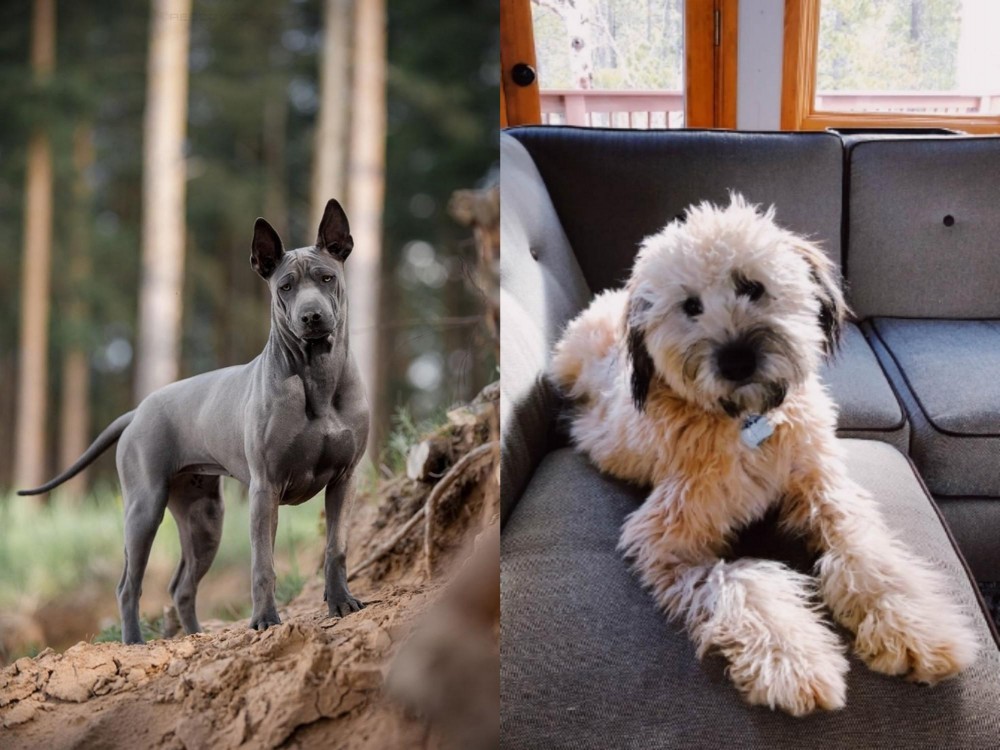 Petzlover
Petzlover Thai Ridgeback is originated from Thailand but Whoodles is originated from United States. Thai Ridgeback may grow 11 cm / 5 inches higher than Whoodles. Thai Ridgeback may weigh 14 kg / 31 pounds more than Whoodles. Both Thai Ridgeback and Whoodles has almost same life span. Both Thai Ridgeback and Whoodles has almost same litter size. Both Thai Ridgeback and Whoodles requires Moderate Maintenance.
Thai Ridgeback is originated from Thailand but Whoodles is originated from United States. Thai Ridgeback may grow 11 cm / 5 inches higher than Whoodles. Thai Ridgeback may weigh 14 kg / 31 pounds more than Whoodles. Both Thai Ridgeback and Whoodles has almost same life span. Both Thai Ridgeback and Whoodles has almost same litter size. Both Thai Ridgeback and Whoodles requires Moderate Maintenance.
 Until recently the Thai Ridgeback was not known outside of its native land. However, after being recently recognized as a standard breed, the dogs are getting some notice from the western world. They are one of three known ridgeback breeds with the ridge running the opposite direction of the rest of her fur. The other breeds with this characteristic are the better known Rhodesian Ridgeback and the even lesser known Phu Quoc Ridgeback.
Until recently the Thai Ridgeback was not known outside of its native land. However, after being recently recognized as a standard breed, the dogs are getting some notice from the western world. They are one of three known ridgeback breeds with the ridge running the opposite direction of the rest of her fur. The other breeds with this characteristic are the better known Rhodesian Ridgeback and the even lesser known Phu Quoc Ridgeback.
The Thai Ridgeback is believed to have originated in eastern Thailand but there is no documentation of their actual history. The breed is thought to be descended from the Funan Ridgeback based on a genetic hypothesis. It is thought that the same Funan Ridgeback is an ancestor od the Phu Quoc Dog. This Funan Ridgeback lived over a century ago. Along with the Rhodesian Ridgeback, all have a common ridgebearing ancestor.
It is still unknown where the original ridge came from but it has been shown that all of the ridgeback dogs have the same genetic mutation and even though the Rhodisian is from Africa, there is not a parallel mutation. The Thai Ridgeback is an active, energetic, tough dog. He is loyal, intelligent, and has great jumping ability.
 Known also as the Wheatenpoo or the Wheatendoodle, the Whoodle is a teddy-bear kind of mixed-breed dog, being a cross between Poodles and the soft-coated Wheaten Terrier.
Known also as the Wheatenpoo or the Wheatendoodle, the Whoodle is a teddy-bear kind of mixed-breed dog, being a cross between Poodles and the soft-coated Wheaten Terrier.
He came about in the mid-1900s so he is still quite a new breed. Like with most hybrid breeds, the Whoodle doesn’t have a well-documented history.
Because most hybrids hail from the USA, one can assume that the Whoodle comes from there as well.
 The breed is medium in size and muscular in body. They have a wedge shaped head, a short coat that is smooth and pricked, triangular ears. The ridge on his back is pronounced as the hair grows away from the rest of the coat from the hips to the withers. Puppies can be born with or without the ridge. They are extremely agile. With what is often called a sword tail being carried up, the Ridgeback has wrinkles on his forehead, a black tongue or the tongue has black marks, and almond shaped eyes.
The breed is medium in size and muscular in body. They have a wedge shaped head, a short coat that is smooth and pricked, triangular ears. The ridge on his back is pronounced as the hair grows away from the rest of the coat from the hips to the withers. Puppies can be born with or without the ridge. They are extremely agile. With what is often called a sword tail being carried up, the Ridgeback has wrinkles on his forehead, a black tongue or the tongue has black marks, and almond shaped eyes.
The coat sheds minimally and is dense, while the eyes are usually brown – in blue dogs they can be amber. The color of the coat is fawn, red, black or blue with a black mask on the reds. There are 8 different ridge patterns: Feather, violin, saddleback, needle, arrow, bowling pin, lute, and leaf. The broader the ridge the better the dog is considered for show.
There are two epistatic genes that determine the ridge and its size. The more genes of this type the individual dog has, the broader the ridge will be. There must be a dominant gene for the ridge to appear at all.
 The Whoodle is a medium-sized dog that stands at between 30 and 50cm in height and weighs in the region of 9 to 20kg.
The Whoodle is a medium-sized dog that stands at between 30 and 50cm in height and weighs in the region of 9 to 20kg.
He has a silky, medium-length coat that can be fairly straight or wavy and which is available in a range of colors – black, brown, grey, cream and red.
He isn’t a heavy shedder, but their hair can grow fairly long so he will have to be groomed one way or the other. Many people choose to have him trimmed at the doggy salon. With the Poodle being in the mix, it is thought that the Whoodle coat is hypoallergenic, sought after by dog owners who suffer from allergies.
Just because of the dog breeds your Whoodle dog comes from, you can know that you’re going to have a playful, happy, friendly, outgoing, social pet who will have no doubt inherited a lot of good qualities from both parent breeds.
He will happily settle down with you in the city or the countryside. He absolutely loves human company and isn’t the kind of dog to be put outside for hours separated from his humans.
If there are children in the home, they’ll discover that this little dog is always up for a game. He gets on well with children and other pets. Early training and socialization will be imperative for the Whoodle as he is a strong-willed dog, inclined to be stubborn and you want to make sure he is obedient.
 The Whoodle is a hybrid dog – a mix between the soft-coated wheaten terrier and the poodle.
The Whoodle is a hybrid dog – a mix between the soft-coated wheaten terrier and the poodle.
They make splendid pets and companions and are cheerful and intelligent, wanting to be constantly by your side.
Because both of the parents are working dog breeds, he is an active dog too, loving to take part in all the activities his family is busy with.
When you bring this little teddy bear of a dog into your home, you’re going to have years of benefiting from a true canine companion.
 With such a mysterious origin, there are not a lot of documented episodes of genetic illness as the breed has been isolated in Thailand and natural selection has driven reproduction. There are only a few issues that they are genetically predisposed to. These include:
With such a mysterious origin, there are not a lot of documented episodes of genetic illness as the breed has been isolated in Thailand and natural selection has driven reproduction. There are only a few issues that they are genetically predisposed to. These include:
• Dermoid Sinus – this is a genetic skin condition known as pilonidal sinus as well. This is a defect in the neural tube and the sinus might be removed. If the sinus is wrapped around the spinal cord and cannot be removed it can be tied off.
• Bloat – can be terminal if not treated as soon as possible. Bloat is a distension of the stomach and intestines which can twist and tangle, killing the dog almost immediately without veterinary attention.
 The Whoodle is considered to be a healthy little dog but they can suffer from some of the many common dog illnesses there are. It’s important to feed your dog well and to exercise him to ensure his good health. Some of the common health problems he could suffer with -
The Whoodle is considered to be a healthy little dog but they can suffer from some of the many common dog illnesses there are. It’s important to feed your dog well and to exercise him to ensure his good health. Some of the common health problems he could suffer with -
It is important to ensure your Whoodle has his vaccines to prevent some of the deadly canine diseases there are.
Also, it is a good idea to have your pet neutered or spayed to prevent an unwanted litter. Spaying and neutering have health benefits for your pet, so it is a good idea to have this done for them.
 1. Feeding the Puppy - Don’t over feed the puppy as they are inclined to become obese. Feed a high quality protein rich puppy for medium breeds. Feed in 3-4 smaller meals per day. As he grows be aware of bloat possibilities.
1. Feeding the Puppy - Don’t over feed the puppy as they are inclined to become obese. Feed a high quality protein rich puppy for medium breeds. Feed in 3-4 smaller meals per day. As he grows be aware of bloat possibilities.
2. Feeding the adult dog - The risk of bloat is even greater in the adult and so is the risk of obesity. Don’t feed large meals and don’t feed before or after strenuous exercise. Feed in 2 smaller meals per day.
4. Games and Exercises – Energetic and needs serious exercise. She loves to swim, retrieve, hike, hunt, and catch frisbees. Likes search and rescue and guard dog work.
 Apart from your Whoodle requiring regular nail trimming, you will want to brush him twice a week to keep their coat free from matting. Some Whoodle owners prefer to have their pets professionally groomed.
Apart from your Whoodle requiring regular nail trimming, you will want to brush him twice a week to keep their coat free from matting. Some Whoodle owners prefer to have their pets professionally groomed.
Check inside his mouth while grooming to ensure there are no bad teeth. This could cause your pet a lot of pain and he has no way of telling you this.
As a medium-sized dog, you want to feed your pet a commercially manufactured dog food that has been formulated for a medium-sized dog and one with lots of energy.
Their dietary needs change from puppyhood to adulthood and where the puppy received 4 bowls of food a day, the adult Whoodle will require 2. Always buy the best quality food you can as the choice of food you provide has a huge impact on his health.
Some home-made food is always a good idea too but it needs to be simple and plain, without any exotic spices. Boiled chicken, rice and vegetables is always a splendid choice and it can be added to the dry kibble as a supplement.